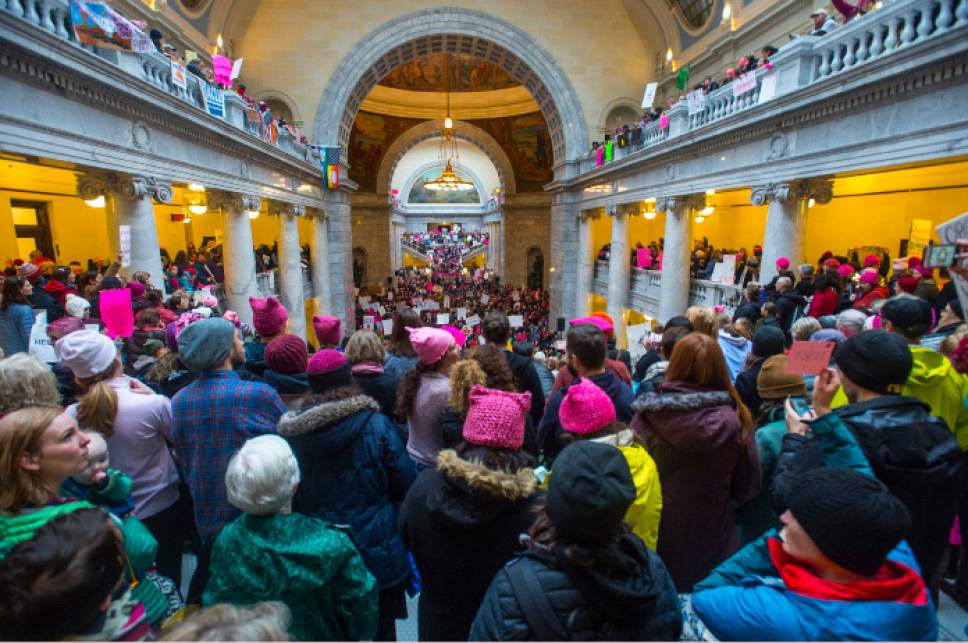This is an archived article that was published on sltrib.com in 2017, and information in the article may be outdated. It is provided only for personal research purposes and may not be reprinted.
Money talks.
But, in some cases, it may only be a little small talk to cover up an awkward silence.
Speak up, and those in power may listen to something besides the cash. Especially if you bring 5,999 of your closest friends along with you.
The other day the Tribune published the results of reporter Lee Davidson's nose-to-the-grindstone analysis of campaign finance reports concerning members of the Utah Legislature and their donors. The headline was the fact that, of all the money reported as given to and received by the 104 members of the Utah House and Senate, a measly 3 percent of it came from voters who lived in the receiving candidate's district. Nearly all the rest, 92 percent of the total, came from special interest groups, activists and lobbyists.
Pile that on top of the pro-Republican gerrymandering that is common here and the low levels of attention most legislative races draw, and you can wonder if our Legislature is less elected than it is bought and paid for.
Of course, lawmakers predictably trotted out the notion that their votes are not for sale. That no special interest — not the homebuilders nor the real estate dealers nor the drug companies nor the billboard companies nor the nuclear waste storage business — expects or receives the power to command any member of the Legislature how to vote.
But just because it's not that blunt doesn't mean that it's all good for democracy.
It is only human nature that if someone does something for you, you have a strong and generally healthy urge to do something for them in return. It's only decent. And if politicians say they don't think that way, they are denying their humanity.
It is probably true that donors and lawmakers are seldom, if ever, so crude as to make a check and a vote a quid and a quo. What the donors are buying with their money — the money given to the politicians and the money paid to the lobbyists and lawyers and social media developers — is access. Face time. Lunch. A round of golf. A Jazz game. A returned phone call. A chance, perhaps a very brief chance, to explain their position on an issue.
When that explanation carries the day, it is probably nothing so naughty as a repayment for the cash. It is just that the donors and their lobbyists were the only ones who had the chance to give the politicians their pitch. Absent similar opportunities for access for the average Joe, who may not even know what's being talked about, lawmakers hear only one side of a lot of arguments, especially on issues they are not experts on, concerning bills they didn't write.
But as Jesse Unruh, speaker of the California Assembly back in the 1960s, so famously said to his fellow lawmakers about how they should deal with lobbyists, "If you can't eat their food, drink their booze, (do something completely inappropriate with) their women, take their money and then vote against them, you've got no businesses being up here."
The other day, at least, the many women Utah legislators encountered were not the in-kind donation that Unruh spoke of. They were part of a wave of (mostly) female citizenry that marched up to the Capitol building in the snow, echoing huge marches in previous days in Washington, New York and around the world.
Generally, the assemblies were to protest the coming to the White House of a man who shows no respect for women, personally or politically, and to make their feelings, and their numbers known. Here, the point was to try to get through the thick skulls of the testosterone-heavy Legislature that, no matter who is president, they aren't going to stand for anything that rolls back the gains in rights made by women, minorities and LGBT folks.
It was impressive. But to really matter the march is going to have to be followed by a constant flow of attention to the issues and citizen-style lobbying, with marches and rallies, yes, but also getting on the list of people who testify in committee hearings, lurking the halls with the professional lobbyists and, as recommended by people who know this stuff the best, phone calls. Lots and lots and lots of phone calls.
Voices without money can be heard, at least at the state and local levels. But only if they never, ever shut up.
George Pyle, a Tribune editorial writer, has been howling into the storm like this for 40 years.



